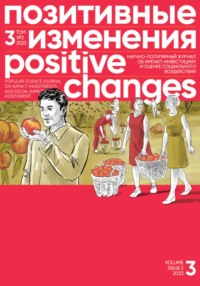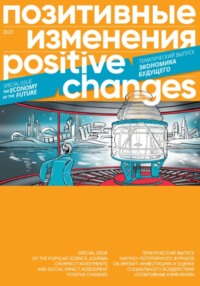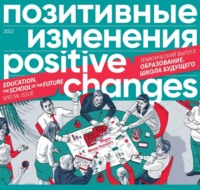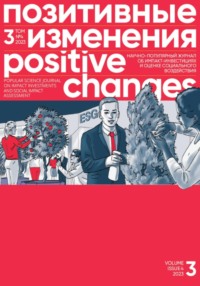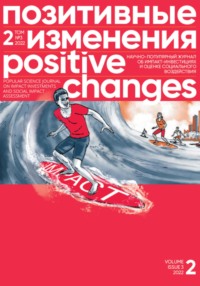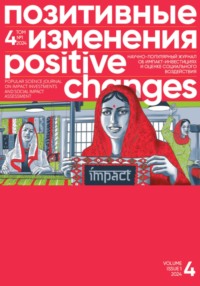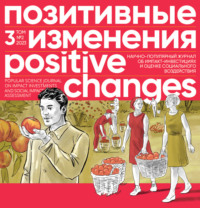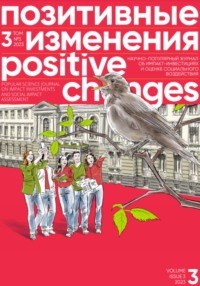 полная версия
полная версияПозитивные изменения. Том 2, №4 (2022). Positive changes. Volume 2, Issue 4 (2022)
Я вообще за то, чтобы инвалиды платили за вход в театр, в музей и т. д. Может, не 100 %, но 50 %. Тогда музей будет знать, зачем он делает доступную среду, потому что он что-то зарабатывает, и люди с инвалидностью тоже его посетители. Пускай человек с инвалидностью тоже зарабатывает деньги. Не хочет работать – пусть дома сидит, смотрит телевизор. Не надо ему никаких музеев.
Как сделать так, чтобы таких компаний, как ваша – эффективно решающих социальные проблемы общества, значимо меняющих в лучшую сторону жизнь сообществ, регионов, стран и всего мира – становилось больше в России? А в мире?
Мне кажется, надо, во-первых, показывать успешные кейсы. Их достаточно много. Есть парень в Калининграде, у него YouTube-канал называется «В процессе», и он снимает промышленные предприятия, общается с бизнесменами и интересными людьми, которые создают что-то новое. Он летом к нам приехал, сделал выпуск, за три месяца – полмиллиона просмотров, 3 000 отзывов, откликов и комментариев, и из них 2 995 – позитивные. У нас такого не было никогда. Я понимаю, что людям просто зашел такой контент. То есть на фоне этого цунами негатива, связанного со всеми текущими событиями, коронавирусом и СВО, позитивный контент востребован. Люди пишут: «Давайте вместе откроем реабилитационный центр», «Давайте откроем мастерскую», «Мне все надоело, я заработал денег, я хочу сделать что-то настоящее», «А давайте мы сделаем то-то», «Я буду пандусы варить», еще что-то. То есть выпуск просто выстрелил. Мне кажется, это один из важных моментов. А второй мы уже проговорили – маленькие проценты, длинные деньги. Наверное, все.
Можно ли научиться быть социальным предпринимателем?
Мое личное мнение – это невозможно. Ты либо предприниматель, либо нет, и это сразу видно. Да, часто бывает так, что человек или его родственник, или друг попали в ситуацию, и это заставило этого человека пойти в социальное предпринимательство, решая проблему этого друга, родственника или еще кого. Здесь просто надо поддерживать этого человека без создания огромных федеральных структур, которые тратят кучу денег на одну образцово-показательную выставку, которую потом покажут по телевизору.
Какой у вас личный KPI?
У меня последнее время на все один KPI. Первый и самый главный – ты смотришь что-то и задаешь себе вопрос: «Это настоящее или нет?». Как с той же образцово-показательной выставкой. Это настоящее или это для трех чиновников? Есть финальные пользователи, которые купят товары? Если их нет, значит, это ненастоящее и не надо больше выставок проводить.
Кстати, специальная военная операция как-то повлияла на ваши отношения с зарубежными партнерами?
Да, и очень сильно. Половина партнеров приостановила поставки. Скандинавы, например. Фактически, работают как раньше китайцы, тайваньцы, а из европейцев работают те, с кем у меня были личные, близкие отношения. С помощью консула Евросоюза мы получили экспортную лицензию на немецкие моторы. Мы четыре или пять месяцев простояли с арестованными моторами, а сейчас с этой лицензией везем моторы как раньше. То есть там, где был хороший контакт, там мы выдержали.
Каких-то новых партнеров вы ищете взамен ушедшим?
Вместо датчан, у которых уникальная лестница-трансформер, ты не найдешь других. Их просто нет. Нам все говорят: «Делайте сами». Я понимаю, что такое «делайте сами». На коляску смотришь, кажется, так все просто, а там трубы 16 видов. И тебе завод на Урале продает минимум тысячу метров. У тебя только в трубу каждый раз вложения – 3 млн. Моторы – 5 млн, джойстики – 6 млн, ткань – 3 млн.
Мне сейчас надо новую модель коляски делать, я понимаю, что по вложениям это будет 30–40 млн, а мне в это время надо бодаться с поставщиком китайских колясок.
Вы – один из самых известных социальных предпринимателей в России, у вас множество наград. Что вы считаете своим главным достижением? И что для вас показатель настоящего успеха?
Достижение – это команда и то, что у нас сейчас получается. То есть вот они, реально, мои люди, которых я возил по Европе и показывал: «Отсюда черпайте идеи, отсюда». И потом мы с ними вместе, стоя по щиколотку в грязи, закладывали первую капсулу с письмом потомкам в первый бетон фабрики. И ты сейчас с этими людьми гуляешь по красивому офису на втором этаже, смотришь вниз на высокотехнологичные станки. И круто, что вы вместе это родили.
Мы уже немножко заелись. Нам опять кажется – мало, неинтересно, медленно. Но ты, когда считываешь эмоции других людей, которые к нам в гости приезжают, а к нам уже двухэтажными автобусами возят гостей, понимаешь, что мы, и правда, что-то правильное и хорошее сделали.
Важны ли для вас деньги как показатель успеха?
Деньги, знаете, нужны, но они не важны для меня сами по себе, они для меня важны как инструмент, который позволяет быть независимым и реализовывать какие-то действительно интересные, красивые проекты, не более того. И то же самое с известностью, со славой. Не знаю, я к этому очень спокойно отношусь. Это инструмент, во-первых, чуть-чуть сэкономить на рекламе, потому что, если за деньги бы то же самое было, то сюжет о тебе на «Первом канале» стоил бы сумасшедших денег. А здесь это все бесплатно.
А во-вторых, мне хочется построить лучше, чем то, что мы видели в Германии, в Швеции. И у нас это получается. И хочется просто зажечь максимально большее количество небезразличных людей, их сердца и души для того, чтобы то же самое происходило еще где-то.
Два года назад мы в Калининградской области раздали порядка 20 млн рублей грантами. Мы это сделали как общественная организация инвалидов «Ковчег». А в прошлом году такие же гранты раздали уже по всей территории России, поддерживая проекты, которые меняют жизнь инвалида-колясочника к лучшему. Я считаю это тоже хорошим достижением.
В плане эффективности работы кто для вас пример и визионер?
Я на Илона Маска смотрю и не понимаю, каким образом надо быть настолько эффективным, чтобы делать революцию в семи сферах. Слушаю его интервью, где он формулирует, почему у него это получается. И, соответственно, хочется сделать в России хотя бы в нескольких сферах такую же настоящую революцию. Сделать в социальной сфере то, чего не было в России.
Я думаю, мы доживем до того времени, когда в мозг парализованного человека будут вживлять чип, передающий нервные импульсы к местам ниже травмы, чтобы восстановить движение мышц, и на латиноамериканские танцы с девушкой я еще схожу.
I'm an Optimist and I Know I'll Always Succeed. Interview with Roman Aranin
Yulia Vyatkina
DOI 10.55140/2782–5817–2022–2–4–4–15

The Positive Changes Journal is launching a new column, People of Impact. In this column, we will share inspiring stories of the people who managed to achieve substantial changes in their communities, regions, and even countries. The first guest of the new column is Roman Aranin, CEO of Observer, a company producing and repairing rehabilitation equipment for the disabled. We talk to him about ways to create a social model of understanding disability, why an entrepreneur needs positive thinking, and how to do things in Russia that have never happened.

Roman Aranin

Yulia Vyatkina
Editor, Positive Changes Journal
How would you define the impact of your company, the Observer?
We have created a new social model, where people with disabilities themselves determine what they need and what it should look like.
For the region in general, this turned out a very beautiful project. An enterprise appears that is run by a wheelchair user, and where 25 % of the employees are wheelchair users, and what they do is not bending staples all day long, but operate assembly lines, welding robots, or milling machines. That is, we show that with a properly adapted environment, a person with disability can do absolutely the same work as a person without a disability.
Our social model is about giving people a job, rehabilitation, assisted living. We create all this ourselves, and the state receives service in its purest form. Roughly speaking, if the government built the same thing, it would probably take five years and cost 150–200 million rubles. Meanwhile, we did it all with our own money. Ten assisted living cottages cost about 35 million rubles, the rehabilitation center another 50 million. That is, we did it in a year and a little less than 100 million.
How did you get to all these results?
What periods can be distinguished in your company's development?
The road was long enough. We started making wheelchairs in 2009. Four years later, we set up a public organization called the Ark, and we started employing people with disabilities – two or three people at a time. First to the wheelchair repair shops, then to the resource center that worked on creating an accessible environment, then to the beaches, etc.
Eventually we felt the need to do something more serious, because someone's wives, someone's mothers kept coming to us, asking for help: "Hire, hire him” and we just didn't have any place left to hire people. And then we made up our mind to build a factory. However, we immediately ran into the problem that many key employees did not have housing, some lived on the other side of town. For starters, we built cottages for three of our employees, and then we thought we would also need a building for the rehabilitation center.
So we went on with the assisted living idea. That is, we would pull a man out of his family, someone who had never lived on his own. For example, a young man who got disabled at 16, lives on a fifth-floor in an apartment building and never goes out. We would move him to our cottage and teach him to live independently, so that he could cook for himself, wash himself, etc. Eventually, we would start full-on rehabilitation, with physical therapy and electrotherapy.
What helped you achieve these results?
What factors contributed to this?
First of all, we weren't afraid to set the bar high. Because if you set the bar at 30 cm, that's as high as you're going to jump. If you set it at two meters, you start looking for a pole to jump with, etc. We set the bar high right from the start.
Second, team play. I have a real professional team – competent people I can confidently delegate things to, without whom I wouldn't be able to do anything.
And the third point is cross-sector interaction, when you can approach the authorities and say: “Look, it just so happens that we're more in the loop than you are. Let's go there together and solve this problem together.”
We weren't afraid to set the bar high. Also I have a professional team – competent people I can confidently delegate things to, without whom I wouldn't be able to do anything.
Three or four years ago, the governor of Kaliningrad Region stood with me in the field where the Observer factory is now. I was explaining to him why this was the right spot to build. When foreign guests come to Russia and particularly to Kaliningrad Region, they will get their first impression of the country, starting with a green English lawn and a futuristic factory. He understood this and felt a sense of belonging.
We opened the factory together with the Minister of Labor and Social Protection of the Russian Federation, Anton Kotyakov. I hope he also has the sense of belonging to the project. Like everyone else in power. Someone saw it at the stage of excavation and pouring the foundation. And now they can compare it to what we have today. One of the most important conditions is interaction and the sense of belonging.
It turns out that learning to cooperate with the authorities is a prerequisite for success?
Yes, that's right. I keep saying this all the time. You need people in the government to be able to come to you, feeling comfortable knowing that you're not going to beg for excessive favors, but that you, as a team, can actually do something.
So this is not the classic Russian story with the government in one corner and the NGOs and businesses in the other; we do everything together.
And what about the opposite? What hindered your development? What are the key deterrents?
Last year we barely had the time to produce and ship our wheelchairs; this year we have 300 units sitting in the warehouse. The deterrent here is not another domestic manufacturer appearing, but the government purchasing wheelchairs from China.
Is import substitution possible in your case?
As a matter of fact, we are import substitution. Our wheelchair is made of 65 % Russian parts. If, God forbid, China is closed down for political reasons or due to COVID, we will be the only company able to make our wheelchairs domestically.
It might take us a month, or two, or three, or even six months to substitute the remaining 35 %, but, unlike the Chinese wheelchairs, we are that import substitution.
They say the hardest part is getting started.
How did your project begin? Where did you look for investment at the start? Maybe someone advised you on how to launch a social enterprise?
I've been in business for a long time, so I have more ideas than the opportunities to implement them. I happily share my ideas so someone else can implement them.
It all started with wheelchair repairs. We were faced with the fact that there were no repair shops for electric wheelchairs. We got support from Vagit Alekperov's "Our Future” fund, which offered us an interest-free loan of 5 million rubles for five years. That's how we got our start.
Then, all of a sudden, I won the General Director Magazine award in 2013. The award was 100,000 dollars (3 million rubles back in the day). We used the money to build our first premises.
And where did you look for like-minded people and a team?
At first, I tried taking a sales manager and turning him or her into a «social-mind» worker. Turns out it doesn't work that way. So we changed direction. We started sourcing "social mind" workers from the Ark events (kayaking and adapted beaches in Kaliningrad Region). These were students fascinated by the project idea. Then we turned these «social-mind» worker into press secretaries, sales managers, and other employees. That's how we eventually built our team.
Who else supported you?
It seems to me that when you are into social entrepreneurship not for the money, but to solve a social problem, when your eyes are bright and you radiate the energy, the right people and money will automatically come into your life and to your project.
If suddenly they don't turn up, you will realize eventually, a year or two later, that you just weren't ready for the money at the time. You just weren't given the opportunity from above; and once you are ready morally and organizationally, the right people just come along.
Let me tell you the story of the EU Consul. We received a micro-grant of 100,000 euros, which was handed out by a local organization. We reported on our activities: the beaches, the workshops, the delivery of accessible environment, the social and tourist taxi, etc. After that, the EU Consul asked for a meeting. He came, he looked, and he said: "Why don't you apply to our grant competition?” I must have spent half an hour talking my way out of it. I told him: "We don't know how, we're not up to it." – "You still have to try it."
We ended up sending the application. Then solicited the head of the Department for Working with the Disabled of Kaliningrad Region government to work for us. We spent a year writing the grant application and won 750,000 euros at once, with which we began to develop the territory for the factory.
When you are into social entrepreneurship not for the money, but to solve a social problem, the right people and money will automatically come into your life and to your project.
Did you have any inspiring examples like people or organizations that helped you believe in yourself, in the success, in the technology?
Yes, we traveled a lot around Sweden, Germany, and Poland. I have an idol in Germany, an old man who is now 78 years old. He has a 16,000-square-meter factory with 400 employees. He has a cervical spine injury, just like me. And he makes the world's greatest catheters and urine receptacles. He also has a hotel there – two luxurious buildings sharing a glass roof. There are trees growing between the two buildings, and a beautiful restaurant in the courtyard. We borrowed the idea of cottages near the Observer factory from him, just added a kitchen.
You can live in this posh hotel or cottages for three days and be able to get into any room, even the swimming pool. You just ride up, push a 30-by-10-cm button on the wall, and you get into absolutely any room. It's not until day three that you realize you're living in a disguised rehabilitation center where wheelchair users brew beer right in the kitchen, where they cook their food. It's all very impressive.
I was sitting with him, talking. He has his own vineyard somewhere in the Canary Islands, and he was treating me to a Riesling. I told him: "Look, I have this idea to build a factory, but, man, I'm 45 years old.” He said: "Roma, 45 is the very age to get into an adventure called the factory. That's how I got in this trouble.
We traveled around Sweden a lot, too. It's "the land of victorious communism.” We had a lot to learn from them. The Swedish Minister of Welfare is now a friend of mine, and I asked him a question: "Look, I get it, we're coming to you because you are living in the future, but why are you coming to us?” He said: "Roma, it is easy to build communism when you have money growing on trees. But we are running out of money too, so we're very keen to see how you do it without the money.” That's also an interesting example.
We already started talking about the team, which is one of the components of success. Can you tell us a little more about your team of employees? What are the key roles of the participants? Are there development directors, operations directors? How many people do you have working for you?
It's not really hard. We are changing and growing so fast right now that our organizational structure cannot keep up with the changes. We now have four legal entities, each with its own tasks and activities, social organization, production, distribution.
We opened a sewing shop in January 2022. We make all the cushions, backrests, seat bases ourselves. It has its own supervisor, and I don't even go there. Everything just works perfectly. At the production site we have the chief engineer, who is also my partner, the head of production facility. We lured him from the Yantar plant. I do visit them and guide them from time to time. But generally my colleagues are handling the operations on their own anyway. There rehabilitation center is a separate entity. It is run by a girl who we poached from the Government of Kaliningrad Region. I am not worried about that side of operations at all. I make some strategic decisions, I attend the meetings, but basically this unit is almost entirely autonomous.
Honestly, we just did what we had to. When we got to the point where I physically could not handle all the workload myself, I had to delegate. What we are missing now is a sales director and a development director. We will grow up a little more, and they will appear.
When you realized that you had become a media and public personality, did the attention of the media and authorities appear? At what point did this happen?
I always found it important to speak in public, to share my ideas, to ignite people with them, etc. Then I broke my neck in 2004 and I experienced an insane lack of information. Just then the broadband Internet appeared, the first forums, and I started writing about what was happening to me. I already had a crowd of subscribers at the time, because for everyone it was a life-giving refreshment, information on how, where and why to go to rehab.
Next, when we organized "The Ark,” a public organization for the disabled, and started doing things, the organization gained reputation. The mayor and the governor knew they could trust the guys from the Ark. That is, we are the crazy organization that, for example, received a grant of 100,000 rubles, added 100,000 of our own, raised another 100,000 from the Kaliningrad residents, invested it all in a project and did something useful with that money. Active work started around 2013. With that reputation, it was easier to develop.
How did your life change after that?
It changed so much that I moved from working nine hours a day to 15.
Surely you had periods when it seemed that everything was a dead end, you couldn't get any further. What helped you in those moments?
I'm an optimist. I know it's going to work out. Always.
I tell my daughters: "Do you know the difference between me and that man over there? He starts a great business and knows right away that the glass is half empty, so he almost certainly won't succeed. He takes on any task, but he has a negative attitude from the start. And the universe hears him: "Okay, whatever you say."
Whatever I take on, even when it seems like a completely lost cause, I know exactly I will have it work out. If it doesn't work one way, we'll try another. We may not get the results directly, but one way or another we will get them.
So you're a proponent of positive thinking?
I guess so. It doesn't all come from reading books, it's my gut feeling. That's the way it's always been. I know things will always work out.
When you have to talk about the results of your activities, in what “dimensions" or “values" do you do it? Do you have a specific system for evaluating the results, the impact of the project?
For example, we have satisfaction questionnaires for clients who have received our wheelchairs and questionnaires for people who have been in rehab. At the end of the course, they write down what they liked, leave their wishes, etc. It's all valuable feedback. Then we read it all out at the council. But live communication with people is always better. So, we started doing campfire gatherings at the end of the rehabilitation course. We roast shish kebabs, eat pilaf, and socialize with the guys in this informal atmosphere. That's much cooler. People relax and tell you: "Look, the main effect for me is not that my knee started bending or that I was able to leave the wheelchair and start walking with a walking frame, but that my kids, who had grown to hate me over the last three years, are now visiting me again. They took a two-month break from me and started visiting me, saying that I had become positive and interesting to talk to again and they wanted to communicate with me.” It's not often that you read this kind of confession in a questionnaire.
I always found it important to speak in public. I've been in business for a long time, so I have more ideas than the opportunities to implement them. I happily share my ideas so someone else can implement them.
What project are you working on right now?
We have an unfinished 5-hectare garden park behind the factory. We would like our patients to be able to go out for a walk and sit under the pine trees, not just attend the rehab.
A separate training area, where we simulate all the obstacles a person can face in the city: 1,000-year-old German cobblestone, regular paving stones, rails, a drain gutter across paving slabs, ordinary ramps, steep ramps, all kinds of steps. We will be training people to overcome obstacles. Greenhouses, too, where we could grow some vegetables.
You have both a business and The Ark public organization. How are their activities related?
We do not really separate the two organizations, because most people from the Ark also work at the Observer. As a rule, Observer employees are involved in all of the Ark's projects. For example, if I have to go and measure curbs, commission a building that has been renovated by the city, or monitor the commissioning of some new housing, I also send my guys out.


